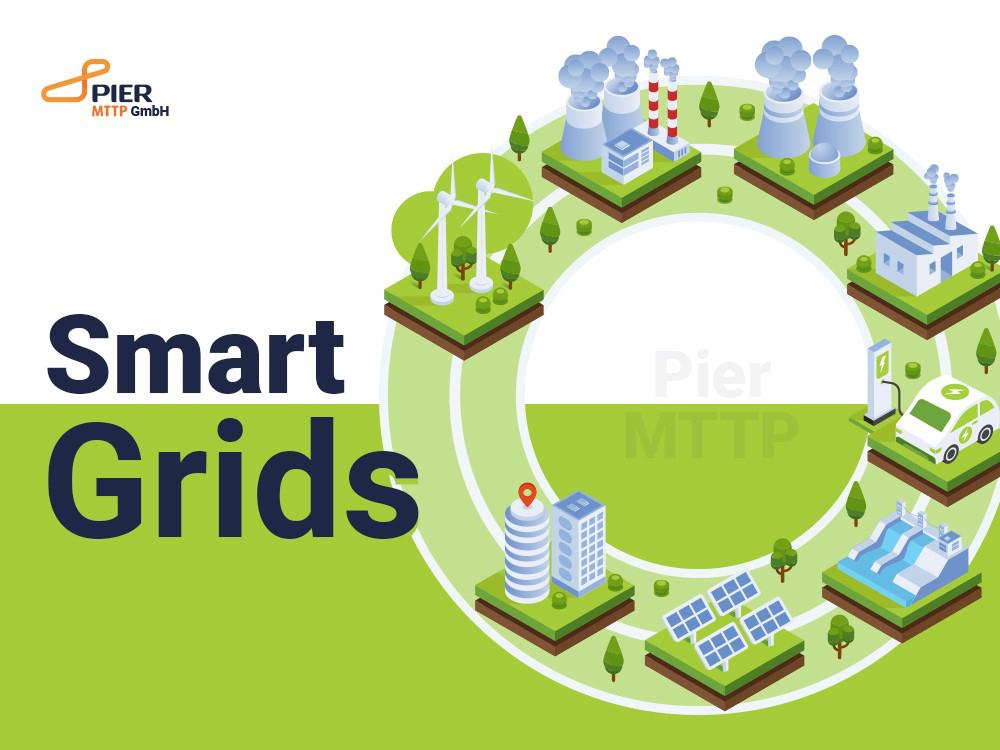Smart Grids

- Smart Grids
- The Role of Smart Grid Technologies in Energy Management
- Pier MTTP’s Smart Grid Structure
- Hardware and Software Components
- Energy Storage Technologies
- The Use of Artificial Intelligence and IoT in Smart Grids
- Environmental Impacts of Smart Grids
In today's world, the use of information technologies in electricity generation, transmission, and distribution processes is becoming increasingly widespread. Where traditional methods fall short, smart grid technologies stand out as systems that provide various conveniences to both producers and consumers. As a company specializing in energy management and digital energy solutions, Pier MTTP plays a significant role in the development and optimization of these systems.
The Role of Smart Grid Technologies in Energy Management
The growing global population and industrial growth are increasing the demand for electricity day by day. Electricity generated from fossil fuels raises concerns about environmental pollution. As a result, the integration of renewable energy in homes and industrial facilities is becoming more common. Green energy technologies such as wind and solar power hold an important place in this process, and the electricity generated can be connected to the grid or used in off-grid systems.
Smart grid systems can be defined as structures that can generate a portion of their energy needs, offer energy storage solutions, and sell this energy back to the grid when necessary. In the process of modernizing the electrical grid, each component must be environmentally friendly, flexible, and adaptive. Pier MTTP provides advanced technologies for the development of these adaptive systems and works to make these systems more efficient.
Pier MTTP’s Smart Grid Structure
Smart grids are created by integrating the existing electrical infrastructure with information infrastructure. The primary goal of these grids is to reduce the rates of electricity loss and theft, making energy usage more efficient. Additionally, integrating energy produced from renewable sources into the system is among the aims of these structures. Pier MTTP contributes to making energy production and distribution more efficient by providing high-performance solutions in these integration processes. While smart grid infrastructure projects may initially be seen as costly, it is anticipated that these costs will be recovered in a short time through the energy savings achieved.
Hardware and Software Components
Smart meters and smart home appliances are essential hardware components of these systems. On the software side, data infrastructure, internet-based systems, and intuitive routing software are prominent. Pier MTTP enhances the efficiency of smart grids and optimizes energy management processes through innovative software and integrated solutions developed in this area. Smart meters can communicate with smart home automation to control the use of these devices and help reduce costs in situations where electricity pricing is variable.
Energy Storage Technologies
Energy storage technologies include options such as supercapacitors, micro superconducting magnetic energy storage systems, high-power flywheels, pumped hydroelectric, compressed air energy storage, sodium-sulfur batteries, and lithium-ion batteries. Pier MTTP offers extensive solutions for optimizing these technologies and integrating them into smart grid systems.
The Use of Artificial Intelligence and IoT in Smart Grids
Smart grids are revolutionizing energy management by providing a more efficient, flexible, and reliable electricity infrastructure. Two of the most important technologies behind this transformation are artificial intelligence (AI) and the Internet of Things (IoT). AI analyzes large amounts of data in smart grids, enabling more effective decision-making in energy production, transmission, and distribution processes. For example, AI algorithms can predict energy demand, balance loads, and help detect faults early. IoT, on the other hand, increases the system's flexibility by enabling grid components to connect with each other and share real-time data.
Pier MTTP enhances the efficiency and reliability of smart grids by developing solutions that integrate AI and IoT technologies. The advanced technologies offered by Pier MTTP facilitate communication between smart meters, sensors, and control systems within energy distribution networks. These systems analyze energy consumption habits, allowing for the development of better management strategies. Additionally, AI-supported decision support systems make managing the complexity of the grid easier while increasing energy supply security.
Environmental Impacts of Smart Grids
Smart grids offer significant opportunities for environmental sustainability. While traditional energy systems result in a high rate of energy loss, smart grids minimize these losses and improve energy efficiency. The more effective integration of renewable energy sources into the grid reduces the use of fossil fuels, decreases carbon emissions, and minimizes negative environmental impacts.
Pier MTTP contributes to this process by offering environmentally friendly solutions in smart grid projects. The company develops systems that integrate green energy technologies, increasing energy efficiency while reducing the environmental footprint. Smart grids enable better management of energy consumption and production, ensuring that energy resources are used most efficiently through dynamic pricing systems and demand response programs. This not only helps achieve environmental sustainability goals but also contributes to reducing energy costs.
Through its innovative solutions, Pier MTTP plays an important role not only in the energy sector but also in the field of environmental sustainability. While smart grids make a cleaner energy future possible, they also raise social awareness and encourage the use of environmentally friendly energy.
Conclusion
Smart grids balance energy usage by reducing peak power consumption and increase the effectiveness of dynamic pricing systems. With the integration of smart metering and data transmission technologies, along with legal regulations and the strengthening of energy lines in Turkey, it will be possible to achieve demand adaptation, predict interruptions, and automatically resolve faults in the energy market. Pier MTTP aims to contribute to a sustainable and efficient future in the energy sector through the innovative solutions it offers

Comments